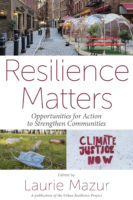 In 2021, all the good news came with an asterisk.
In 2021, all the good news came with an asterisk.
American democracy survived an unprecedented assault on January 6, but the nation is more bitterly polarized than ever. Lifesaving COVID vaccines were developed in record time, but a substantial swath of the American public refused to get the jab. The Biden administration swept into office on promises to tackle climate change and “build back better,” but progress was thwarted by key lawmakers on both sides of the aisle.
In this hopeful and frustrating year, contributors to the Island Press Urban Resilience Project celebrated our collective progress, while highlighting how far we have yet to go.
For example, in “Good jobs: the unfinished work of environmental justice,” Dr. Beverly Wright lauded the Biden administration’s landmark Justice40 Initiative, which directs 40 percent of federal investments to disadvantaged communities. To fulfill its promise, Dr. Wright argued, Justice40 must also include job training and workforce development for those who have been left behind.
On environmental justice issues, there is plenty of unfinished work. To gauge our progress, the Urban Resilience Project organized a virtual roundtable on the 30th anniversary of the First National People of Color Environmental Leadership Summit. Participants included Summit veterans who have shaped the movement for decades, as well as younger leaders on the front lines of current struggles. Participants celebrated the Summit’s extraordinary achievements, while recognizing the enduring racial inequities that are now playing out in the climate crisis.
The new administration brought a welcome shift on environmental issues, with appointments and proposals aimed at addressing climate and other challenges. But here, too, there are asterisks: the fine print of legislation and implementation can derail the best of intentions. Our contributors stepped into the breach, offering guidance to the administration on a wide range of issues. For example, in “If you build it, we will thrive,” Henry Cisneros and William Fulton called for targeted infrastructure investments that advance economic and environmental goals. Albert George urged FEMA to change rules that are driving South Carolina’s Gullah-Geechee people from their land. And David Coursen tallied the terrible environmental costs of stagnant EPA funding.
Examining the fine print, our contributors sometimes found a dark side to seemingly positive developments. In “Don’t fall for the hydrogen hype,”Eddie Bautista and Lewis Milford observed that hydrogen is not the clean fuel its promoters claim it to be. And Todd Litman took aim at pneumatic tube trains, autonomous vehicles and other forms of “new mobility”, contending that low-tech options like transit and bicycling are better for people and the environment.
In the wake of 2020’s reckoning with racial injustice, 2021 saw a welcome emphasis on diversity within the environmental movement. But, as Lois R. DeBacker and Jacqueline Patterson argued, “The problem isn’t just diversity; it’s access to money”. Because it neglects environmental justice groups, “most environmental philanthropy is not aligned with the greatest need, or opportunity, in our field,” wrote DeBacker and Patterson. Similarly, Peggy Shepard charged the Bezos Earth Fund with shortchanging environmental justice nonprofits; later in 2021, the Earth Fund announced substantial new support for EJ groups.
In a year of qualified good news, our contributors made an unambiguous contribution to the public conversation. They read the fine print, highlighted neglected issues, and spoke truth to power. Their stories and solutions have now been collected in a new e-book Resilience Matters: Opportunities for Action to Strengthen Communities, that is available online at no cost.
In these pages, they take full measure of the challenges we face. But they also offer visions of a fairer, greener future — with no asterisks.
Click HERE to view and download the Resilience Matters e-book.





